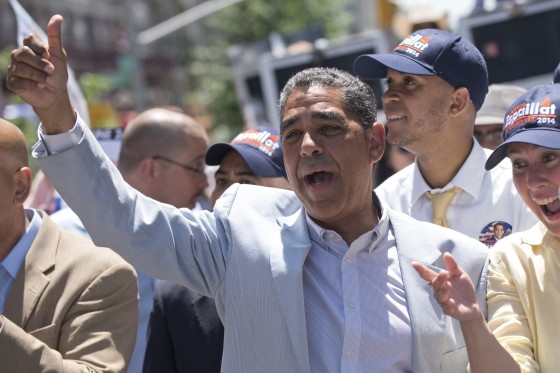New York state Sen. Adriano Espaillat is on track to become the first Dominican-American member of the U.S. House of Representatives. His primary victory comes after losing two consecutive challenges to unseat longtime incumbent, Democratic congressman Charles Rangel in 2012 and 2014.
"The American Dream is still alive," said Espaillat, who said his New York congressional district "made history."
Espaillat won 36.7 percent of the vote in a nine-way race for the 13th congressional district in the New York Democratic primary Tuesday. He faces a Republican opponent, attorney Tony Evans, but the district is overwhelmingly Democrat.
Espaillat beat Keith Wright, who was hand-picked by Rangel, by 3.6 percent. Wright, who is African American, had not conceded by Wednesday noon, and was demanding a recount of absentee ballots.
But many in the Dominican community were not waiting to celebrate. "Adriano Espaillat just became the Dominican equivalent of Neil Armstrong walking on the moon," said Cid Wilson, a national leader in the community. "Becoming the first Dominican ever elected to Congress has been the political holy grail for Dominican elected officials — our community is deeply proud of him."
When Rangel retires in 2017, he will have served 46 years in Congress. Rangel is one of the more prominent African American members of Congress and is a founding member of the Congressional Black Caucus.Though his father was Puerto Rican, he has said he had painful memories of him and did not grow up with him. Rangel was the first black congressman in the powerful House Ways and Means committee.
RELATED: A Fight For The Latino Vote In NY's 13th Congressional District
Espaillat, who chairs New York state Senate's Puerto Rican/Latino caucus, is the first Dominican elected to a state legislature. Born in the Dominican Republic and educated in New York City, he got his start as a community organizer in northern Manhattan.
Angelo Falcón, a political scientist and founder of National Institute of Latino Policy in New York City, told NBC News Latino that Hispanic advocates and activists have been trying to create a third Latino congressional district in the city for the last 20 years.
Although Rep. Nydia Velázquez and Rep. José Serrano — both Puerto Ricans — are longtime members of Congress, Falcón said the U.S. Dominican population, which has grown significantly in New York and states like Rhode Island in recent decades, has needed representation of their own. More Dominicans live in the New York area than any other city except Santo Domingo.
RELATED: Dominicanos USA Registers Over 100K Voters In Its First Year
“In terms of the national Caribbean population, the overall Latino representation will be strong with Puerto Rican representatives, and now a Dominican," Falcón said. "This is positive for the dynamic between Latino populations.”
Throughout the contentious election, Falcón said people believed that challenger and former state assemblyman Guillermo Linares, who is also Dominican American, would take votes away and "spoil" Espaillat's chances at winning.
The African American population in the Bronx and Harlem have declined since Rangel took office, especially after the district was reconfigured in 2012, according to Falcón. Currently the district is about 31 percent black, 24.6 percent white and 4.7 percent Asian. About 54 percent identify as Latino. Falcón emphasized that the 13th district does not have a monolithic Latino population because two-thirds are Dominican, one-quarter Puerto Rican and less than 10 percent Mexican.
The Latino Victory Fund, which supported Espaillat's campaign, commended his victory in Tuesday's primary, citing his "successful" tenure as a state legislator which has prepared him for the congressional seat.
"Throughout his exemplary career, Sen. Espaillat has worked tirelessly for the Latino community in New York, and we know that he will continue his hard work and represent Latinos in the halls of Congress. ,” said César J. Blanco, Latino Victory interim director and a Texas state legislator. “Sen. Espaillat’s victory today is a significant step towards achieving Latino equal representation in Congress."

